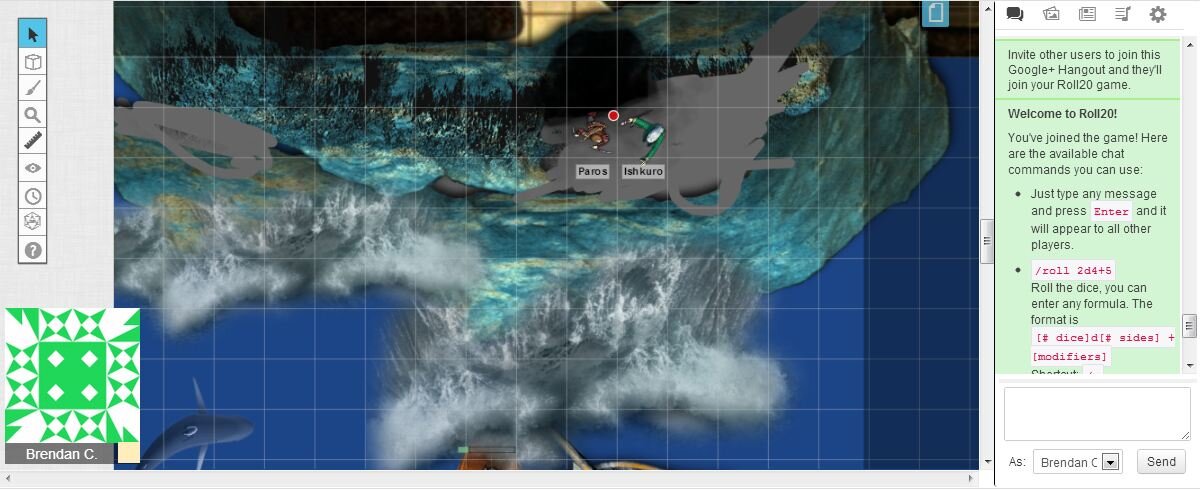Remote Gaming: Roll20

In May, d-Infinity laid out a comprehensive guide to remote tabletop gaming. Not included in that particular article, however, is Roll20 -- a piece of technology that was just concluding its Kickstarter campaign around the same time. The d-Infinity crew has since been able to try it out in a number of its own remote gaming sessions, and this piece will outline the team’s experience using it and why technology like Roll20 might be something to include in a game session.
Following are addenda and updates to the Digital Dice article found in d-Infinity Volume #4 : Dark Future, which was written in May 2012 and lays out a comprehensive guide to remote tabletop gaming. Not included in that particular article, however, is Roll20 — a piece of technology that was just concluding its Kickstarter campaign around the same time. The d-Infinity crew has since been able to try it out in a number of its own remote gaming sessions, and this piece will outline the team’s experience using it and why technology like Roll20 might be something to include in a game session. This article would not be complete without a brief introduction to Roll20 for those that are not familiar with the technology, and so that is where it will begin.
Roll20 is a product that rolls video conferencing, character and initiative management, and map building into a single easy-to-use web-based solution. Those interested in running a game through Roll20 need only make a free account on their website; the software itself is hosted entirely on the web — some browser plugins may need to be installed to get the service running. Roll20 is system-agnostic in more ways than one; it is not built to support any specific game system and it will run on any computer operating system. For purposes of this article it will suffice to say that the software is very easy to use, but thorough “how-to” documentation is available on the Roll20 website for those interested in learning to use it.
As mentioned initially, this article aims to illustrate the d-Infinity team’s experiences and thereby demonstrate why a technology like Roll20 deserves to be part of any game master’s toolbox. The staff members of d-Infinity are separated by hundreds or even thousands of miles from each other, but that was not traditionally the case. In the team’s “golden age” of gaming, its members lived within 40 minutes of each other and players had elaborate dungeons made up of fancy miniatures to look forward to interacting with (we thank co-publisher Armorcast for many of these!). Since most of d-Infinity’s members moved to different states, the solution has been to stream via webcam live images of those same miniatures from the game master’s house. The visual effect is still excellent, but the game master has to put in a lot of extra effort to move all of the miniatures and the game becomes a spectator sport for players.
Roll20 brings interactivity back to the remote game in a big way, and enabling multiple users to interact simultaneously with a digital game board is the most obvious draw to the technology it offers. Even for gaming groups that share the same physical locales, with today’s proliferation of laptops and the relative ease with which high-quality looking maps can be pulled together in Roll20, there is merit to people using the technology while sharing the same room — but be sure to mute microphones and speakers to save a headache! Surprisingly, the technology also enhances the storytelling of the game in a way that this author has never seen physical models replicate.
Cinematic effects are most often described verbally, and therefore players are told what they see rather than discovering it for themselves. In the d-Infinity team’s last game using Roll20, the players discovered a single torch left in a dungeon hallway that they had already passed, indicating the presence of someone or something following them. The players never saw the game master place the torch, never knew it was coming, and therefore the experience of discovering that symbol of danger was completely unspoiled. d-Infinity editor-in-chief Michael O. Varhola claimed to be genuinely “creeped out” by the encounter. Physical miniatures would not have been able to recreate the same results, and this makes Roll20 a technology that truly enhances the storytelling of an RPG.



